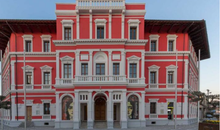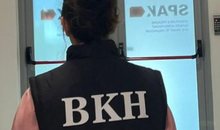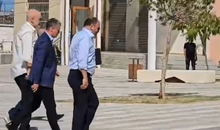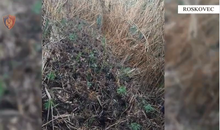
 Flash News
Flash News

High production costs are negatively affecting the domestic industry of raw materials and pushing the processing industry towards imports. This trend is most visible in the milk processing industry.
Both for the managers of processing factories and livestock experts, the removal of the creditable VAT scheme, the high informality of the sale of milk by the farmer and the low subsidies compared to the region are the main problems that are causing difficulties not only for livestock farmers and processing plants, but for the economy as a whole.
In the month of April, due to the conflict with the prices from the factories, no milk was bought from large and medium-sized farms.
The only ones who sold milk at a price of 60 ALL without VAT per liter were the small farms. The reduction in the selling price forced livestock farmers to go out in protest twice, in defense of their production, demanding more subsidies from the Albanian state.
The largest processors in the country claim that the price of domestically produced milk is 38 cents more expensive than milk imported as raw material from Slovenia, Serbia or Hungary, including taxes and transport costs.
"We only collect cow's milk and at the moment we collect it from the local farmer, at a price of 60 to 66 Lek without VAT, depending on the quality.
We got the milk from the 3 biggest farms, we also have about 50 medium-sized farms and hundreds of small farms as other suppliers.
At the moment, milk in countries like Slovenia, Hungary, etc., is cheaper, as they have higher productivity in the stables and lower costs than the local farmer", says Luis Ndreka, from the ADG company (formerly Lufra).
Ervin Resuli analyzes that the main reason for the high cost of production in Albania remains the low subsidies that the state gives to farmers compared to the region.
"In Serbia, the state subsidizes the farmer 350 euros per cow + 17 lek per liter of milk produced (in 2023 the subsidy per liter of milk produced increased from 15 lek to 17 lek in 2024).
In total, for 6 thousand liters of milk produced per year from 1 cow + the subsidy per head, the farmer is subsidized 1,350 euros per cow. With this level of subsidy, the farmer in Serbia has his profit protected by the state.
That's why he sells milk cheaper than the Albanian farmer, almost at the cost of production.
In Kosovo, subsidies reach 600 euros for 1 head of cow. In North Macedonia, the farmer is subsidized 250 euros per head of cow + 10 lek per liter of cow's milk produced. In total, it benefits from a 900 euro subsidy per year for milk.
In Albania, the Albanian livestock farmer receives 10,000 lek per head of cow + free oil. In total, the subsidy received per cow reaches 120 euros per year.
So the subsidies given in Albania to livestock farmers are at very low levels, which make it impossible to produce at a low cost".
Even Gerald Zyfi, the administrator of the "Zyfi Farm" workshop, says that the main problem with the cheap price of collected milk remains the very low subsidies given by the state to farmers compared to the region.
"In Albania, there is no milk subsidy per liter produced, while the subsidies given per head are "alms". While the price continues to remain higher for the farmer, since production costs are higher compared to the region", he asserts.
The Association of Albanian Processing Industry has warned earlier that if the situation continues in the same form, then import products will be even more present in our market, pushing out the local products, which will no longer be popular. from the consumer and the Albanian production companies will necessarily go towards a certain bankruptcy.
"If the government will not increase the appropriate subsidies for livestock farmers, so that they have lower costs for the production of milk, what would bring the price, the same or very close, of the milk of Albanian livestock farmers to the price of the milk of fresh from the farmers of the region/EU and if there will not be the same prices for oil, electricity, gas, the difficulties will be added to the milk processing sector.
As a result, imported products will dominate and will be present every day and more on the shelves of markets, supermarkets and on the tables of Albanian consumers", the association stated earlier.
Removal of the VAT creditable scheme
For the managers of large farms, familiar with the sector, the decline has started since the removal of the creditable VAT scheme.
"The vast majority of small farms sell milk without an invoice, so they operate completely informally. If a processor buys milk from an unlicensed small farm, according to the law he must issue a self-invoice for the purchased goods and will start with -20%, which in this way has killed himself.
In this situation, when the small farmers are not formalized, this factory that buys milk from a small informal farm has two ways to act, either it will buy in the black and sell in the black itself, or it will to buy milk abroad at a cheaper price.
Where is the state in solving this situation? The VAT crediting scheme helped to formalize the small farmer, while self-invoicing is suicide", said one of the managers of the largest farms with cows, sheep and goats in the country.
Representatives of the sector have often raised concerns about the increase in production costs from the removal of the creditable VAT scheme. In 2017, the VAT refund was 20%.
The VAT refund scheme allowed processors to be reimbursed for the deductible VAT when they purchased goods accompanied by a tax invoice from farmers.
The 20% VAT compensation for the tax period left a high profit margin for the processors, even when they bought the milk from the farmer at a high price. Then, from 2019 to 2022, the creditable VAT was reduced from 20% to 6%.
The fiscal changes of 2019 brought the reduction of the VAT level to 6% on purchases (invoicing with 6% VAT on milk purchased from farmers) and 20% sales VAT on dairy products. While from 2022, the creditable VAT became 0%.
The Processing Industry Association proposed that the removal of the creditable VAT scheme be replaced by a scheme similar to the countries of the region, so that the VAT is invoiced the same on both purchases and sales, at levels 6 or 9 %.
Their request was not approved by the Ministry of Finance, in the drafting of the 2022 budget. The removal of the refundable VAT scheme was replaced by the provision of direct subsidies of up to 10,000 ALL per head of cattle or cows.
The processors warned that the provision of direct subsidies per head would not reduce the cost of the Albanian farmer, when subsidies per liter of milk produced are applied throughout the region.
In addition to the decision to remove the refundable VAT scheme for agro-processors, the imposition of the 10% VAT on agricultural inputs was also approved, where since 2018 it was zero.
Also, from July 1, 2022, an excise tax of 6 lek per liter was imposed on gas, increasing the cost of production from milk factories./monitor
Latest news


Fiscal peace, but at a cost
2025-07-05 18:00:10
'Bankers' tax evasion, Chinese CEO and former director jailed
2025-07-05 17:39:21
Kyle Walker joins English club on two-year deal
2025-07-05 17:20:24
Two cars collide on the Saranda-Delvina axis, 4 injured
2025-07-05 17:05:29
Touching gesture! Liverpool will pay Jota's family's salary until 2027
2025-07-05 16:45:18
The zodiac signs that cheat most often
2025-07-05 16:25:53

"I asked for the dismissals", Dredha tries to soften Rama's 'blow' in Vlora
2025-07-05 15:48:49
Bomb threat in Parliament, prosecutor: It was a lie
2025-07-05 15:22:28

Bardhi: The recount revealed how greedy Zeqine Balluku is in stealing
2025-07-05 14:44:29
Knife wound on the secondary road Tirana-Durrës, perpetrator sought
2025-07-05 14:37:54
Tears and pain, Diogo Jota is escorted to his final home
2025-07-05 14:21:34
Success starts with yourself! Simple ways to invest in personal development
2025-07-05 13:58:50
Unlicensed firearms found in apartment, 50-year-old arrested in Lushnje
2025-07-05 13:43:11

Tirana Court remands Skerdi Sina to prison
2025-07-05 12:59:34
Cocaine laboratory in Greece, here are the Albanians arrested and wanted
2025-07-05 12:40:16
Directed Justice/Vangjeli: SPAK does not investigate any scandal involving Rama
2025-07-05 12:22:03

Bomb alert, Police remove MPs and media from Kosovo Parliament building
2025-07-05 11:48:16
"The will of the people" and the irony of ordered resignations
2025-07-05 11:32:05
Summer drowning risk: How to enjoy the water without risking your life
2025-07-05 11:20:27
Fire situation in the country, 16 fires reported in 24 hours, 4 still active
2025-07-05 11:07:04
Car hits pedestrian at white lines, injured in serious condition in Vlora
2025-07-05 10:59:58
Mosquito-borne diseases are a growing problem in Europe
2025-07-05 10:44:13



One of Sweden's most dangerous and wanted criminals arrested in Turkey
2025-07-05 09:38:29
Foreign exchange/ How much foreign currencies are bought and sold today
2025-07-05 09:18:38

"Don't be influenced by the opinions of others", today's horoscope
2025-07-05 08:40:50

Morning Post/ In 2 lines: What mattered yesterday in Albania
2025-07-05 08:02:07

Trump says he's ready to raise tariffs to 70% on some countries
2025-07-04 22:35:52
Tre shenjat e zodiakut që do ‘pasurohen’ në Korrik
2025-07-04 22:05:09
Gaza War: Hamas Accepts US Proposal for 60-Day Ceasefire
2025-07-04 21:50:10
Autocracy in Albania, Fuga: Governance has gotten out of control
2025-07-04 21:40:51
Meta: Agriculture on credit, the new fraud!
2025-07-04 21:26:39




Vote recount in Durrës ends without changes
2025-07-04 20:12:54
Gas station explodes in Rome, 25 injured (VIDEO)
2025-07-04 20:00:20

These afternoon habits often sabotage weight loss
2025-07-04 19:39:28
Former Arsenal player Thomas Partey accused of rape
2025-07-04 19:24:21
Shepherd disappears without a trace in Delvina
2025-07-04 19:14:31

Bardho gave Zegjine's mandate/Braho: Unfair! It violates the electoral system
2025-07-04 19:01:08


Rapid developments in the Sultanates!
2025-07-04 18:00:06



Italy tightens rules for skateboard traffic
2025-07-04 17:20:18

Unusual for the time, dense fog covers the coast of Vlora
2025-07-04 16:48:01


Accident on the Shkodra-Lezhë axis, one dead and 3 injured
2025-07-04 16:14:19
Albania with fewer requests for asylum and Albanian citizenship in 2024
2025-07-04 16:06:57

Albania last for quality of life, DP: Technical government is the solution!
2025-07-04 15:42:30
Nico Williams says "No" to Barcelona, signs with Athletic Club until 2035
2025-07-04 15:33:35
Fires in the country, four fires are still active, what is the situation?
2025-07-04 15:24:20

Summer brings big changes for these 4 zodiac signs
2025-07-04 15:00:04
Osmani: MPs need to agree to a secret ballot for the Speaker of Parliament
2025-07-04 14:51:09
Serious accident on the Peqin-Elbasan axis, two injured
2025-07-04 14:37:56

GJKKO leaves in force the security measure for the head of the KPP
2025-07-04 13:58:17
Who will replace Ilir Meta and take over the leadership of the PL?
2025-07-04 13:50:36
Berisha: Dismissal of directors in Vlora, another act of 'scapegoats'
2025-07-04 13:41:46




Librazhd/ In a serious psychological state, the young man consumes pesticides
2025-07-04 13:05:07


Weapons trafficked from Kosovo to Albania, two arrested, 8 pistols seized
2025-07-04 12:33:28
Konsumimi i tepërt i çokollatës, ja cilat janë dëmet që shkakton në organizëm
2025-07-04 12:23:35

Fires in the country, 21 fires in the last 24 hours, 4 still active
2025-07-04 12:00:19
WB calls for debt transparency: Albania to publish details of every loan
2025-07-04 11:50:05
Changes in the State Police, new names expected to lead 5 police stations
2025-07-04 11:40:06

The race for the head of the BKH, the third phase on July 11
2025-07-04 11:20:23

Toxic phrases that show your relationship is in trouble
2025-07-04 11:00:10

2 brothers arrested in Roskovec, cultivating narcotic plants
2025-07-04 10:38:08

